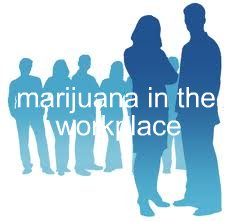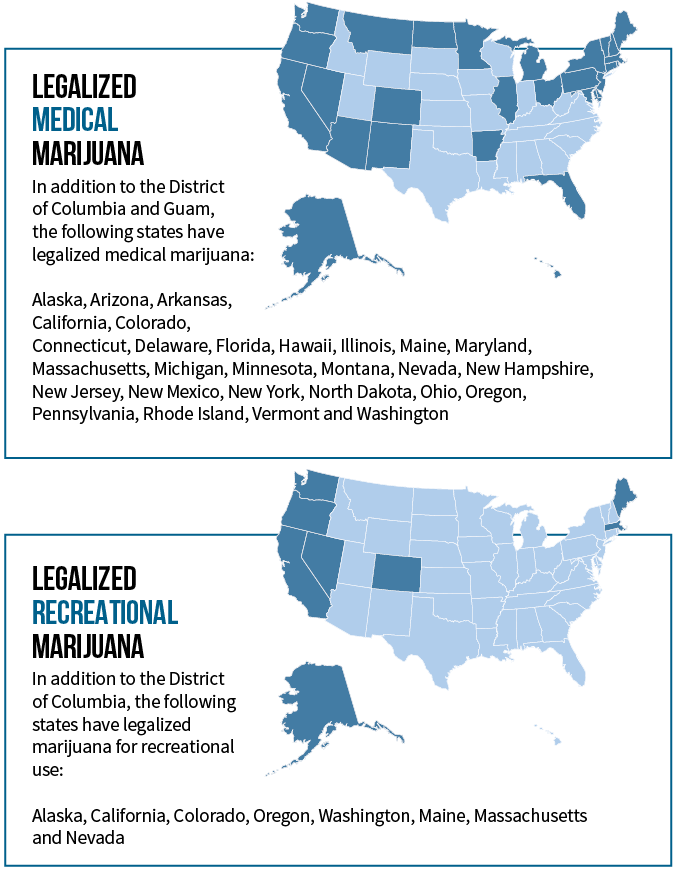Weed at Work
New marijuana laws raise vexing questions for employers.
Let’s be blunt: Like it or not, pot is here to stay. The November election proved this to be true. To date, 28 states, the District of Columbia, and Guam have legalized medical marijuana use. Nine of these have also legalized recreational use of the drug.
Support for marijuana legalization has clearly outpaced the opposition and, in light of new state laws and regulations that permit marijuana use, many employers are uncertain how far they can go and how far they should go when it comes to adopting or enforcing drug-free workplace policies and drug testing.
This uncertainty is compounded by concerns about the impact of marijuana use on employee safety and productivity. According to an August 2016 comprehensive report published by the National Institute on Drug Abuse, “Marijuana significantly impairs judgment, motor coordination, and reaction time, and studies have found a direct relationship between blood THC concentration and impaired driving ability.”
The report also cites a 2014 study that found marijuana was the illicit drug most frequently found in the blood of drivers who had been involved in accidents, including fatal ones.
In light of these and other reports and scientific studies establishing the risks of marijuana use, employers have good reason to be concerned.
Whether or not you support the legalization of marijuana for medical and/or recreational use, if you own a business and employ workers, regardless of the industry, you likely have an awareness of the potential liabilities and risks associated with on-the-job impairment from any substance — be it legal, illegal, prescription or nonprescription. If your business has special-risk or safety-sensitive positions, the potential liabilities and risks are even greater.

Some employers believe that they shouldn’t take action against an employee who reports to work impaired on a legal substance (like alcohol or, in some states, marijuana) when the substance is consumed outside of work hours. This is often referred to as the “privacy” argument (e.g., “What you do on your own time is your business”). However, the time of consumption does not alter the fact that the employee reported to work impaired. Failing to act in a situation like this can have devastating effects, especially for employees in safety-sensitive and special-risk positions.
In addition to the privacy issue, due to unanswered questions about when and how long marijuana users are really “impaired” after use, some employers believe they should not terminate employees who test positive for marijuana when they do not seem to be currently “impaired.” This is also a risky position, should the employee be retained and later cause harm to or contribute to harming a third party. If such an employee tests positive after that type of incident, it could trigger a negligent retention claim. And, if you have terminated others in the past for a positive drug or alcohol test, you could also be at risk for a discrimination complaint.
Despite the privacy and impairment beliefs held by some employers, to mitigate the potential liabilities associated with employee drug and alcohol use, it is essential for employers to hire and retain workers who do not pose an unreasonable risk of harm related to such use.
If your business is located where marijuana can legally be used for medical or recreational purposes, there are still ways to reduce your risk. In spite of new state regulations, you can adopt and enforce drug-free workplace policies and practices that: (1) prohibit employees from reporting to work impaired due to marijuana use, (2) require employees to submit to reasonable-suspicion drug testing, and (3) subject employees to termination for a positive drug test, including those who have a legal “referral” for marijuana.
This is permissible because, under the Controlled Substances Act (a federal law), marijuana remains classified as a Schedule I narcotic with high potential for abuse and no currently accepted medical use. As such, even in states that have decriminalized medical marijuana use, federal law prohibits doctors from writing prescriptions for marijuana. In lieu of prescriptions, doctors issue “referrals” or “certifications” for the drug. If a job applicant or current employee with a referral for marijuana tests positive, because of the Schedule I classification, Medical Review Officers (MROs) who review positive drug tests are prohibited from verifying the test as negative. So even if the applicant or employee has a legal referral for marijuana use and is using the drug according to the specific amount indicated on the referral, the drug test result will be reported as “positive” and the employer is free to terminate on this basis.
If you elect to adopt a drug-free workplace policy without exceptions for medical marijuana, this should be clearly communicated to employees. For example, your drug-free workplace policy could include a clause that reads:
"If an applicant or employee with a legal referral for marijuana (for the treatment of a medical condition) tests positive based on the substance limits for the drug test, it will be reported by the lab as a “positive drug test” and will be treated in accordance with all other positive drug tests. There are no exceptions for applicants or employees with legal referrals for marijuana."
If your business is in one of the nine locations that have legalized recreational use of marijuana, your drug-free workplace policy should also include a clause that reads:
"There are also no exceptions for applicants or employees who test positive for marijuana, even though it has been legalized in [insert your location here]."
Aside from drug testing and drug-free workplace policy issues, there are other considerations for employers in states that permit medical and/or recreational marijuana use, including, for example:
Potential accommodations for medical conditions: It is conceivable that an employee with a legal referral for marijuana use could request an exception to a drug testing requirement or to disciplinary action associated with a positive drug test. Such a request could trigger knowledge of a disability and, for employers covered by the Americans with Disabilities Act (a federal law) or similar state laws that prohibit discrimination based on a handicap or disability, may require consideration of the request as a reasonable accommodation. This is something that would have to be dealt with on a case-by-case basis.
Some marijuana laws include provisions that require employers to accommodate users of medical marijuana, given that they have a medical condition that justifies its use; however, most of these laws do not require accommodating use while the employee is on duty or reports to work impaired. Other marijuana laws have provisions that specifically do not require accommodations. For example, the Florida constitutional amendment decriminalizing medical marijuana and the newly passed Proposition 64 in California that legalized recreational use of marijuana include these provisions.
Lifestyle discrimination regulations: Some states have adopted regulations that prohibit employers from discriminating against employees who engage in legal activities off-duty (smoking, for example). Employers in states that also permit legal use of marijuana should be cognizant of the potential for a discrimination claim arising from action taken against a user on the basis of their off-duty use. In a situation like this, employers will have to weigh the potential risk of this type of claim against the potential risk of harm or safety associated with hiring or retaining a marijuana user.
As employers work through the haze of conflicting state and federal regulations regarding the use of marijuana, one thing is clear — significant risks exist. Ignore them at your own peril! Your business could go up in smoke.
If you are a Client of The Garden Center Group, click HERE to request a copy of our newly revised Sample Alcohol and Drug Use Policy with references to medical marijuana, prescription drugs, and more. Be sure to include your name and the name of your company in the email.
Jean Seawright, CMC

In addition, Seawright & Associates offers Group clients a unique one-on-one service arrangement to help meet additional human resource needs and challenges. For more information about Seawright & Associates visit www.seawright.com.
